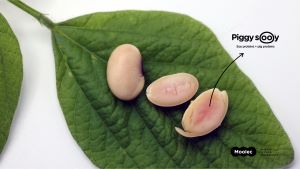“Beef-infused” peas and “pork-infused beans”
By Jeanne Yacoubou, MS
In 2023-24, the Animal and Plant Health Inspection Service (APHIS) of the U.S. Department of Agriculture (USDA) granted regulatory clearance to Moolec Science to introduce its genetically engineered (GE) peas and beans to the U.S. market. This clearance essentially means that APHIS, after their review, believes the GE plants “…pose no greater plant pest risk than non-genetically engineered plants.”
However, Moolec’s GE plants don’t yet have a free ticket into the U.S. because they must first be declared safe for human consumption by the U.S. Food and Drug Administration (USFDA).
Moolec Science and Molecular Farming
Known as a leader in molecular farming techniques which produce animal proteins from GE plants grown traditionally on the farm, Moolec Science has spliced bovine and porcine genes obtained from a virtual DNA bank into the genetic material of pea and soybean plants, respectively. Referring to their products as “beef-infused” peas and “pork-infused” beans because of these genetic additions — not because actual meat is in the peas or beans, which it is not – the company is planning to market them to vegetarians and vegans.
The GE peas have been designed to produce excess bovine myoglobin, a protein that elevates iron content. According to the company website, their product “contains up to 26.6% pork protein over total soy soluble protein.” Moolec believes that their iron-boosted peas will appeal to vegetarians and vegans looking for plant-based sources of iron. The challenge, however, is convincing this targeted audience that they are, in fact, not eating an animal-derived food.
In an October 2024 article for BNN Bloomberg, Gaston Paladini, Moolec’s CEO and an Argentine meatpacking heir, said that “Moolec’s technology doesn’t involve any procedures with animals — none…We don’t take cells from the animal and multiply them. It’s a fully synthetic genetic code that we buy in a DNA bank. We are tweaking nature.”
Moolec intends on selling its GE peas in a can. The pink-hued GE soybeans, trademarked as Piggy Sooy, will be marketed as a tasty, high-protein meat substitute — similar to textured vegetable protein (TVP).
In a September 2024 press release, Moolec confirmed that their GE plants producing Piggy Sooy are already undergoing field tests in Ohio, Missouri, and Iowa in the U.S. Chief Technology Officer and Co-Founder Martín Salinas stated: “One acre of Piggy Sooy could potentially produce pork meat proteins equivalent to 10 pigs, reducing water footprint, land usage and CO2 emissions…Our aim is to heal the meat production system.”
In December 2024, The Vegetarian Resource Group reached out to Moolec for more information about when its products should be available for purchase in the U.S. Moolec Chief Product Officer and Co-Founder Henk Hoogencamp told us:
“They are not [now] available for consumers. We are sampling these though for industrial and institutional partners. These samples are provided under some conditions to make sure we keep the central principles to stewardship up high. Also to clarify, our beans are not infused with these proteins, but the beans make their own version of the animal protein during their growth…We have publicly disclosed our plans and continue to update the timelines every quarter during our shareholder meetings. To save you the trouble of going through the SEC website, I can say that we are gunning to have them on the market 2027-2028.”
Plant Molecular Farming Companies
In 2023, Moolec became the first plant molecular farming food technology company trading in public markets. It is one of a handful of food tech startups in agricultural biotechnology. These companies claim to be on the forefront of creating sustainable food sources in a world increasingly limited in natural resources and struggling to feed a burgeoning human population. Many startups fail when investments run out or they have a difficult time getting off the ground.
According to the Good Food Institute, leveraging plants as hosts for recombinant gene technologies involves using traditional farming practices instead of large bioreactors like in precision fermentation. Some consider these products (animal proteins) “animal-free” crop improvements.
Moolec expresses this idea on their website where they state: “We use plants as small factories without extra energy leveraging in photosynthesis. Moolec develops ingredients that contain a mix of plant and animal proteins as a one-stop-shop solution.”
Although companies — such as Moolec Science — engaged in plant molecular farming say their products are “animal-free,” not all vegetarians or vegans consider them vegetarian or vegan because of the presence of animal-derived genetic material. Whether expressed in plants or in microbes (like in precision fermentation), virtual animal DNA ultimately has its origin in an animal, usually a cow or pig.
While plant molecular farming may use fewer natural resources (land, water, or energy) and produce less pollution — including carbon emissions — than traditional animal agriculture, not all would consider the technology is vegan. We hope food tech companies will clearly label products so consumers can choose which they want to use. Such complete transparency is the only way individuals — vegans and non-vegans alike — can truly decide for themselves whether to consume these food products or not.
The contents of this posting, our website and our other publications, including Vegan Journal, are not intended to provide personal medical advice. Medical advice should be obtained from a qualified health professional. We often depend on product and ingredient information from company statements. It is impossible to be 100% sure about a statement, info can change, people have different views, and mistakes can be made. Please use your best judgment about whether a product is suitable for you. To be sure, do further research or confirmation on your own.

